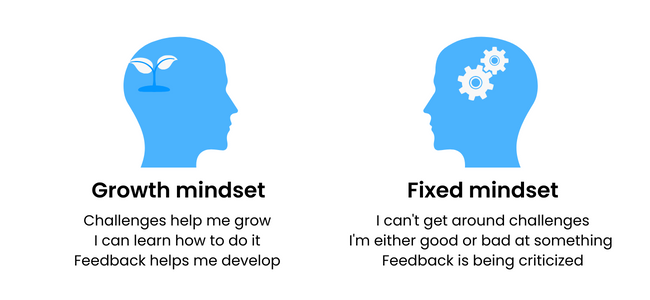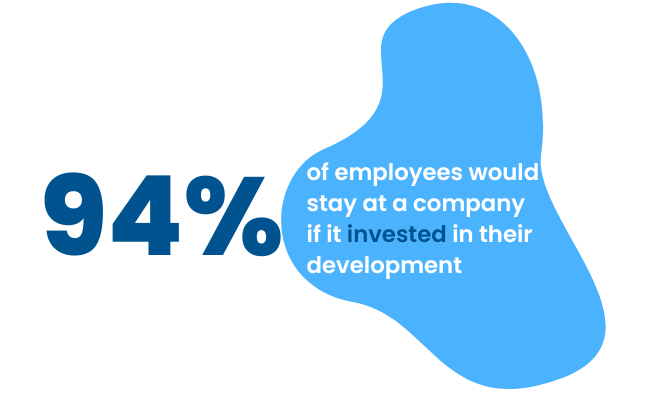
Learn what learner’s mindset is and how it fits into the workplace as part of a robust L&D strategy.
Mindset and learning are intrinsically linked.
With a poor mindset, people will struggle to acquire new skills and knowledge – no matter how hard they try. So, it’s no surprise that a cohort of learner’s with a poor mindset proves challenging for L&D teams.
Of course, learner’s are the custodians of their own thoughts and feelings. But there are numerous ways that L&D professionals can improve the learner mindset in their organisation.
In this blog we’ll explore:
- What a ‘learner’s mindset’ is
- The impact of a growth mindset on organisations
- How you can improve mindsets as an L&D professional
- Supporting remote employees
What is a learner mindset?
A mindset relates to a person’s way of thinking and their opinions.
So, when we think about a learner’s mindset, we need to consider how a learner’s thoughts and opinions impact their propensity to learn.
If an individual heads into a learning opportunity with negative preconceptions of the experience, they’re unlikely to learn as much as you’d want them to.
However, the opposite is also true: if an individual has a positive mindset – the outcomes of the learning will improve.
The truth is, learning is a skill itself.
So you might be in a situation where you need to upskill your people on how to learn effectively. Learning how to learn is a difficult topic for many, however, when honed effectively, this skill can help individuals stand out amongst their peers.
These learners, dubbed ‘intentional learners’, understand that learning doesn’t just happen in the classroom, and often have a growth mindset.
What is a growth mindset?
Having a growth mindset is incredibly important in the modern working world – for both individuals and organisations alike.
Those with a growth mindset understand that their skills and talents can be developed, and they often achieve more than those with a ‘fixed’ mindset.
| Growth Mindset Perseveres in the face of failure Puts in the effort to build new skills Finds inspiration in others success Embraces challenges Accepts criticism Wants to learn & build abilities | Fixed Mindset Avoids challenges Gives up easily Threatened by others success Wants to look smart Ignores feedback Thinks abilities are innate |
Source: TechTello, 2021

A growth mindset doesn’t just impact the individual and their personal career prospects, it also impacts the entire organisation.
Those companies with a collective growth mindset report that employees feel “more empowered and committed, [and] they also receive greater organisational support for collaboration and innovation.”
So, it’s easy to see why having a growth mindset and a positive learner’s mindset are intrinsically linked – so how can L&D improve the mindset of learners?
How to improve learner’s mindset in your organisation
Now you know what learner’s mindset is and why it’s important to consider as part of your learning and development strategy, the next thing to think about is how.
How can you use it within your strategy? And how can you develop it among your people?
We’ve got it down to these four key ways:
- Promote and encourage work and learning balance
- Listen to your learners’ wants and needs
- Provide continuous feedback
- Foster a culture of collaboration
Let’s look at each of these in a bit more detail.
Promote and encourage balance between work and learning
You’ve probably heard of work-life balance, but how about work-learn balance? If your employees are firmly stuck in the day job all the time, they will not have the time to dedicate to learning.
Or, when they do find the time to learn, they’ll feel as though they should be doing their day job. This presents a vicious cycle of resentment towards learning that will hamper the likelihood of your learners having a growth mindset – so it’s time to change that.
Instead of treating something that learners should do in addition to – or instead of – their day job, make sure the time to learn is baked into your employees commitments.
By facilitating time, space and freedom to learn, your organisation will reap the rewards.
Listen to learners wants and needs
L&D have a reputation of being ‘order takers’.
Somebody in the business wants a piece of learning created, and L&D do it – no questions asked. But in recent years, there’s been a huge shift, and one that we think is hugely impactful for organisations worldwide.
Instead of taking orders from the organisation, L&D must create a learning offering that meets both the organisational objectives and learners needs.
Employees’ motivations to learn all come from a place of self-service, such as career progression and staying up to date in their field.
So, if you want to improve their mindset, providing relevant and engaging learning that meets their wants and needs will help you get there.
Facilitate managers providing continuous feedback
Feedback is critical in building a real culture of learning within your organisation.
Your employees are looking to their managers for guidance and praise throughout their development journey – and without it, they can get disheartened quickly.

To keep your employees engaged with learning, and to improve their mindset, make sure your managers know how to provide feedback effectively. Some top tips include:
- Be timely and provide feedback (especially constructive criticism) in a timely manner after the incident.
- Be specific and provide examples: this allows employees to leave with an action plan about what to do differently in the future.
- Be aware of non-verbal communication. Body language and facial expressions can make employees misinterpret your feedback.
- Always feedback on the positive too! This will spark your employee’s desire to do better and work harder.
Foster a culture of collaboration
Collaborative learning is proven to have a positive impact on outcomes, so encouraging collective learning experiences is a great way to improve the efficacy of your learning.
But it also has a huge benefit on the learner’s mindset too.
Those with a growth mindset are said to find inspiration in others’ success. And facilitating group-learning experiences is a great way to share those successes, and learning amongst team members.
Plus, a culture of collaboration also improves the psychological safety of your workplace – further improving the learner’s mindset.
What about remote learning impact on learner’s mindset?
We don’t need to tell you that remote and hybrid working has accelerated in popularity in recent years.
But this has posed a new challenge for learning & development professionals – as connecting with remote learners on a personal level is much more difficult.
However, that does not mean you cannot instigate a positive learner mindset amongst your dispersed employees.
When employees work in a remote or hybrid environment, the organic collaboration and communication of the workplace disappears.
Therefore, when you’re trying to improve the learner mindset in remote employees, you must act on the above tips in a much more conscious and deliberate way.
For example, give your remote workers explicit permission to learn, and encourage a healthy work-learn balance. Use surveys, forums and focus groups to get to know your audience and understand their wants and needs.
And finally, ensure you have upskilled your management team on how to provide feedback to remote employees.
By taking these extra steps, your remote employees will see they are valued within your organisations, and ultimately feel more positive about learning and growth.
How Think Learning can help you improve learner’s mindset
When considering improving your learner’s mindset, you might not think of technology as the solution. But our modern LMS, powered by Totara TXP, can take your initiatives to new heights.
Integrating performance management in your learning function will facilitate a flexible and personalised approach to learning.
Plus, Totara Engage will foster a collaborative culture amongst your team, that recognises, rewards and inspires contributions.
Book a demo to see our platform in action and learn how you can use it to improve the learner’s mindset in your organisation.

